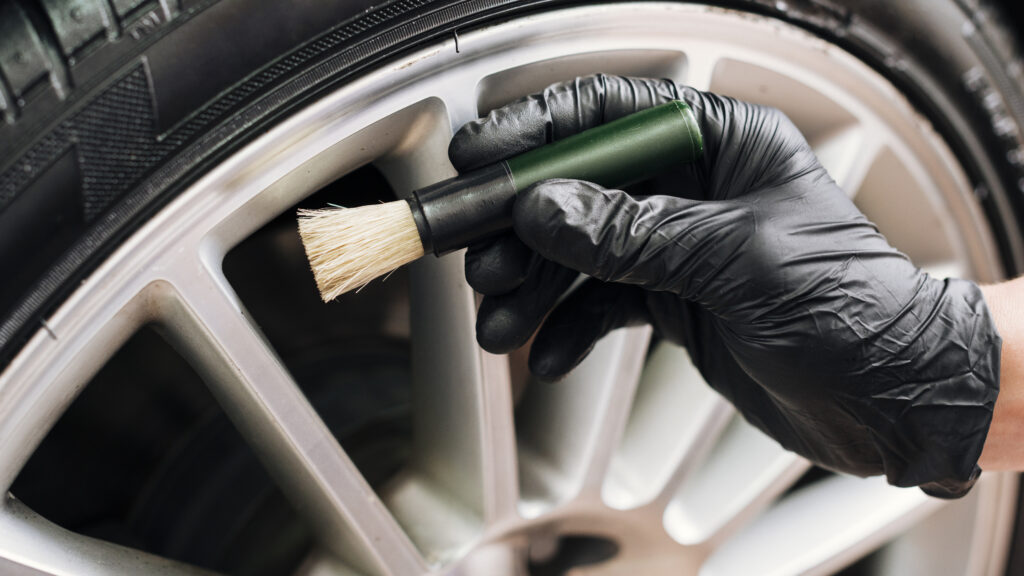Tire cleaning tips: Tire cleanliness is motivated by a variety of factors since it directly affects your car’s safety, performance, and look. To preserve optimal performance and safety features while attaining maximum longevity, your tyres must be cleaned properly. This step-by-step guide combines fundamental tyre cleaning knowledge with practical tips for avoiding common mistakes.
Why Tyre Cleaning is Essential
Enhancing Vehicle Performance
The cleanliness of your tyres improves their traction capabilities, so your vehicle handles better while you brake. Grip gets worse when dirt and grime accumulate, especially so when driving in wet or slippery weather.
Prolonging Tyre Lifespan
Routine tyre cleaning works to eliminate damaging contaminants from rubber surfaces, which extends the lifespan and reduces the replacement costs of your tyres.
Improving Aesthetic Appeal
A shiny car looks its best when it has spotless tyres. Tyres showcase the enhanced appearance of your car.
Understanding Tyre Dirt and Grime
Types of Contaminants
Road Grime
The accumulation of oil road dirt and miscellaneous waste particles from driving represents road grime.
Brake Dust
Tire adhesion of brake dust elements occurs naturally as a result of heat and friction from brake pad degradation.
Environmental Factors
The combination of mud and sap, together with natural materials, typically attaches to your tyres through challenging weather conditions.
How Dirt Affects Tyres
Dirt can cause the rubber to break by retaining moisture. This eventually weakens the tyre’s structural integrity.
Tools and Products for Tyre Cleaning
Essential Tools for Cleaning
Brushes
To tackle hard-to-remove residues, stiff-bristled brushes work best.
Microfiber Cloths
Microfiber cloths make an excellent choice to dry and polish tyres with no scratch damage.
Spray Bottles
To achieve an even distribution of cleaners on tyre surfaces, it’s best to utilize spray bottles.

Effective Tyre Cleaning Products
Specialized Tyre Cleaners
The specialized formulations of these products effortlessly eliminate heavy dirt accumulation without affecting rubber surfaces.
DIY Cleaning Solutions
Baking soda mixed with water or vinegar creates a cheap solution that delivers outstanding cleaning results.
Step-by-Step Tyre Cleaning Process
Preparation Before Cleaning
After parking your vehicle in a covered spot, collect all of your cleaning supplies and tools.
Washing the tyres
You should water the tyres with ample rinse to eliminate loose surface debris.
Applying Tyre Cleaners
Dust the cleaner heavily enough over the tyre to establish uniform spreading.
Scrubbing and Rinsing
To wash away the cleaner, simply apply water and then brush the area.
Drying and Finishing Touches
After drying the tires with a microfiber cloth, add protective sealant to enhance their shine.
Mistakes to Avoid While Cleaning Tyres
Using Harsh Chemicals
Tire cleaners with powerful acids should be avoided because they harm rubber surfaces and wheels.
Neglecting the Sidewalls
The sidewalls are just as crucial as the treads and require regular cleaning.
Skipping Regular Maintenance
You should clean your tyres regularly to prevent the build-up of accumulated dirt because delayed maintenance leads to tougher cleaning tasks.
Advanced Tyre Cleaning Techniques
Steam Cleaning Tyres
Without chemicals, steam cleaning proves to be an effective method for removing stubborn grime.
Using Sealants for Protection
Tyre seals prevent both water and dirt from sticking, which maintains cleaner tires throughout their lifetime.
Environmental Impact of Tyre Cleaning
Choosing Eco-Friendly Products
To protect the environment, select cleaners that break down naturally.
Water Usage and Conservation
To conserve water, use a bucket and sponge rather than a running hose.
Maintaining Clean Tyres
Regular Cleaning Schedule
Roll your tyres through washing once monthly so that accumulation is prevented.
Protective Measures
The best way to protect your tyres is by choosing covered parking spaces and using UV-ray-blocking covers.
Benefits of Professional Tyre Cleaning
When to Seek Professional Help
Tyre stains and damage that cannot be removed can be successfully treated through expert maintenance services.
Cost vs. DIY Cleaning
The affordability of DIY cleaning methods compared to professional operations, yet professionals perform comprehensive cleaning, which delivers enduring results.
Statistics on Tyre Care and Maintenance
Common Issues from Neglected tyres
Scientific evidence reveals poor maintenance causes 75% of tyre failures.
How Regular Cleaning Reduces Accidents
Tyres that stay clean provide enhanced grip performance, leading to a wet-weather accident reduction rate of 20%.
Conclusion
It takes minimal effort to clean tyres and by adopting this simple tyre cleaning, you are not only improving the performance but you are also your safety while driving. The right set of tools and maintenance techniques combined with scheduled tyre servicing will help you maintain ideal tyre condition.
FAQs
I need to clean my tyres what should be the frequency?
Regular cleaning of tyres should happen at least once a month to stop the excavation of dirt while maintaining maximal performance.
Is it okay to clean tyres using dish soap?
Dish soap poses a risk because it takes away protective layers from your tyre.
What technique works best for eliminating brake dust from vehicle tyres?
You must use dedicated brake dust cleaning products, which are built specifically for this purpose.
Can I safely clean my tyres with a pressure washer unit?
Low-pressure use of cleaning products is safe for rubber surfaces.
What signs should I look for when checking if a tyre cleaner is environmentally friendly?
Check the product labels for indications that components are both eco-friendly and toxic-free.
“If this article was useful to you, please share it with your network and share your thoughts in the comment section below!”